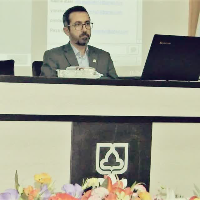Sign-Semantic Analysis Of Imam Riḍā's Discourse System)Case Study: Prayer Asking For Rain)
Sign-semantics is a tool for evaluating how to generate and get meaning in discourse analysis. This new science, with the backing of classical semiotics, provides the opportunity for signs to appear with new signatures in a forward direction. In this paper, using a descriptive analytical method, and in order to examine the semantic sign of the discourse of Imam Riḍā (as), the “Prayer asking for rain” was selected for research. This prayer is due to the nature of narrative discourse, which contains many acts and values, and regarding its semantic sign of governing systems, worth to be considered. Imam as the heir and flagship of Imamate, like other Imams, has the task of transferring and promoting the concept of Imamate. To realize this, they use a number of obvious and hidden methods, but in the face of Mamūn, like some Imams, he proceed the way of taqīyah, and indirectly induces the concept of their intended meaning, the hegemony of Imamate through the prayer asking for rain. This research demonstrates the realization of how the ideal hegemony of Imam Riḍā (as) is, namely, the advent of Imamate, and, in order to identify that hegemony, we need a precise tool to deal with the variety of our discourses. Here the sign-semantics analysis, as an accurate tools, can help us realize this. In this research, various types of discourse systems such as system of action, emotional system and tension system, and concepts for the processing of the concept, transmission of message and communication with the audience were evaluated and shown how Imam Riḍā (as) uses in the prayer, from some discourse systems, and explains the legitimacy of his wilāyat (authority) and his purified family, and hegemonic discourse of the authority.
-
A critical discourse analysis study of Barid Al-Lail (explanation and interpretation levels)
*, Reyhane Emami Chahartagh
Studies in Arabic Narratology journal, -
The semantics of the word “dispute” based on the seven types of Izutsu's simultaneous semantic theory
Sakineh Mosavi Asl, Shaker Ameri *, Ali Akbar Noresideh
Journal Of Linguistic and Rhetorical Studies,



